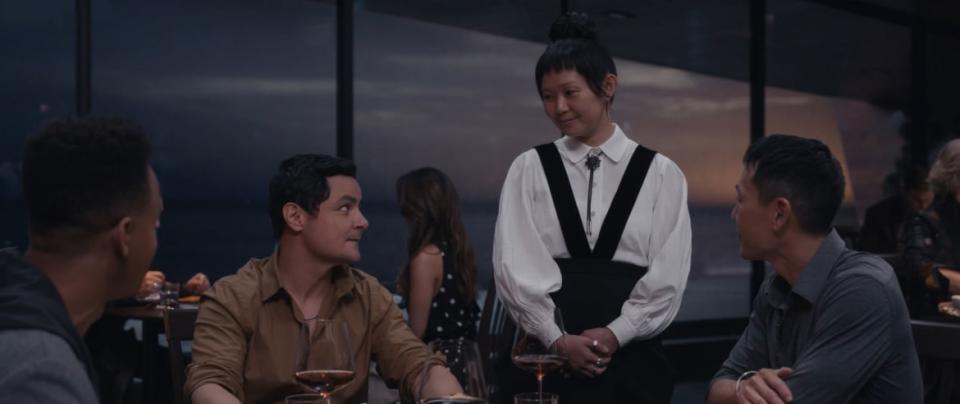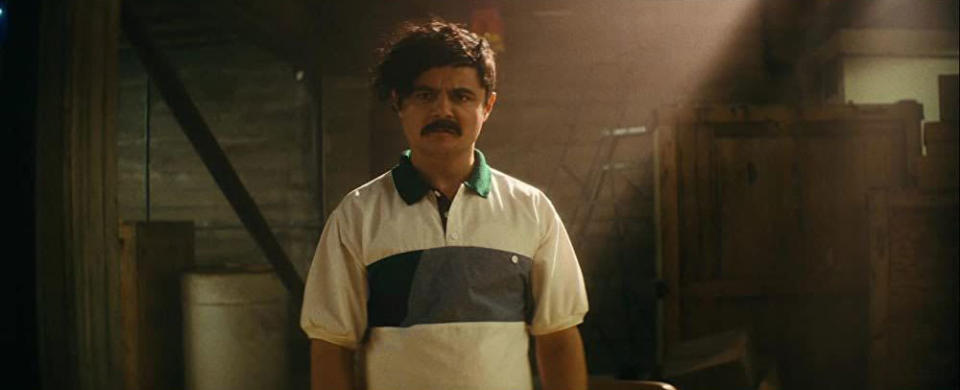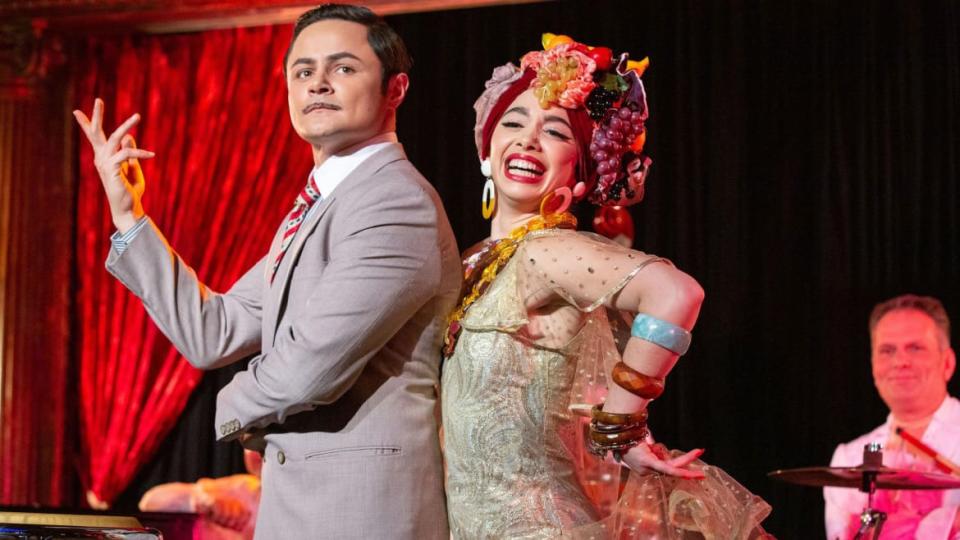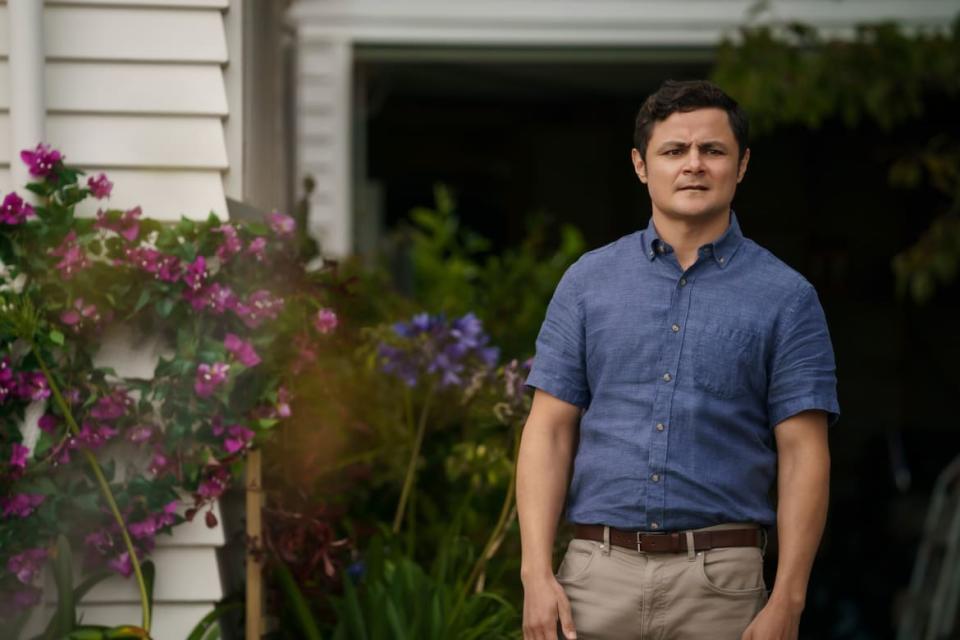Why Arturo Castro Savors Playing the Asshole in ‘The Menu’

- Oops!Something went wrong.Please try again later.
- Oops!Something went wrong.Please try again later.
Arturo Castro is happy to talk about his failures. Not that he’s actually had any proper failures, creatively—the Guatemalan actor’s career comprises cult-favorite turns in Broad City and Narcos, an Ang Lee film, his own sketch-comedy show, and memorable supporting roles in two of the fall’s most special movies.
But as excited as he is to talk about The Menu and Weird: The Al Yankovic Story—both shockingly funny, both released within weeks of each other—the 37-year-old is just as game to relive the losses of two of his proudest works before now. Comedy Central’s Alternatino and Apple TV+’s Mr. Corman lasted just one season each, their fates separately tied to the pandemic. With little in common beyond their untimely endings and shared star in Castro, it might seem strange to point at them as representative of a body of work. But in the eight years since he made his U.S. TV debut as Jaimé in Broad City, Castro’s career is best defined by duality: success and failure, win and loss.
Take his two newest projects, both wins of commercial and critical acclaim.
“It was one of those things that was immediate,” Castro says in a Zoom interview about saying “yes” to The Menu. Mark Mylod’s first feature film in a decade is a jet-black comedy, a thriller encased in a ghoulish, sitcom-like setup: a group of rich, entitled foodies venture out to a remote restaurant that serves only the most elite of the elite. But the chef (Ralph Fiennes), they come to learn, has a death wish for not just himself, but all the diners.
‘The Menu’: Eating at a Restaurant Has Never Been More Horrifying
Castro plays the loud-mouthed tech bro Soren, who’s there with some similarly douchey investors that just wanted a killer meal. (Literally, as it turns out.) Castro plays up Soren’s ill-fated self-absorption with comic panache, talking back to the servers and critiquing the dishes. Most memorably, he and the boys demand some bread, despite the chef’s emphatic declaration that no bread will be allowed at this unforgettable meal.
While playing a doomed asshole eating ostentatious food is fun, what made The Menu especially meaningful for Castro was how diverse the assholes on screen were. It’s an important reminder of the nature of dickishness, he explained.
“The thing is, being a terrible person is not strictly a Caucasian sport,” he says. “We all get to participate in it. That was a big one of the draws for me.” Castro’s douchey diner was joined, for instance, by Rob Yang (who’s Asian) and Mark St. Cyr (who’s Black). The keyword for Castro, too, is that they are “diners”—the people of color in The Menu are not relegated to the back of the house.

“Four Latinos, man,” he says, referring to himself and castmates John Leguizamo, Aimee Carrero, and Anya Taylor-Joy, who is part-Argentine and leads the film as the suspicious Margot. “Four Latinos that are not depicted as being in the kitchen, you know? There’s just characters that happen to be Latin… I don’t know if I’ve ever gotten to be with three other fellow Latinos as lead roles in a movie that doesn’t specifically point it out.”
Castro has spent his career thus far resisting the idea that a person of color must play a person of color, not just a person. It goes back to his first guest spot on a network TV show, he says: “Dishwasher Juan” on The Good Wife in 2015.
“I’m like, how many Juans were there in that episode that you need to specify what was there? Firefighter Juan and then Dr. Juan?” It’s a joke, but it’s also perhaps a question worth asking. Which is why it pleases Castro to keep finding work that doesn’t force him to ask that question. “I’m so happy that we’re living in a time where people can be two things at once,” he says. “You can identify as being Guatemalan and also American, and it’s not this sort of weird concept anymore.”
This, however, is in stark contrast to his role in Weird, Roku Channel’s perfectly titled, not-really-a-biopic “Weird” Al movie. In Weird, Castro plays an over-the-top version of Pablo Escobar, who really wants Al to perform at his birthday party. (Again: a perfectly titled movie.)

Playing a Colombian drug lord is something Castro has done once before, to both notice and acclaim, in the third season of Narcos. This wasn’t a callback to that role, he emphasizes. But he also argues that playing an absurdist Escobar didn’t run counter to his ideals of playing fully formed characters instead of racial stereotypes.
“I love making fun of the drug-dealing stereotype because I think you take a little bit of power away from the glorification of it when you make it a little ridiculous,” he says, adding, “I’m like, fuck that guy [Pablo Escobar], man. I’m like, why wouldn’t he be like ridiculed in this mass murdering? He’s a psychopath.”
Leaning into the ridiculousness is an essential part of Castro’s comedy. It’s why his take on the real-life villain in Weird harkened back to an earlier, favorite project of Castro’s—not Narcos, but the boundary-pushing, stereotype-skewing Alternatino with Arturo Castro.

“The Trump administration was in full swing, and I just felt it was so necessary,” he says of Alternatino, which premiered on Comedy Central in 2019. It began as a web series, before the network picked it up for a 10-episode first season. “There was so much vitriol against Latinos, and the narrative was so toxic about people that looked like me, that I, together with Comedy Central, felt this need to put out this [show, Alternatino].”
Each sketch costumes social critique in straight parody, absurdity, and old-man makeup. Castro plays everything from a terrible translator for a crime boss, a Latin immigrant learning about American mass shootings, and a highfalutin architect.
While the takeaways could be pedantic—Americans fetishize Latinos! Older people don’t understand contemporary gender norms! Pregnancy has become a performative event!—Castro always made sure neither the topic nor the joke went too far or too long. The point was to make sure the audience learned something without forgetting to laugh too.
“Even though it was a comedy sketch show, it was trying to say a lot about what it felt like to be on the receiving end of all this kind of hate,” Castro says. “And by taking the stereotypes and exaggerating them, people were like, oh my God, that’s ridiculous. And I’m like, exactly, dude. Exactly.”
Season 2 was planned for the short-form streaming platform Quibi instead of Comedy Central, inspired in part by Castro’s work on the Quibi exclusive Flipped. But the pandemic had other plans for both Alternatino and Quibi. A second season was written, Castro says, but when Quibi shut down after six months, so did a chance to produce more Alternatino.
That’s when he moved onto other projects, like 2021’s Mr. Corman, which dealt with the pandemic head-on. But the Apple TV+ dramedy, created and co-starring Joseph Gordon-Levitt as an anxious schoolteacher struggling to grasp his reality, didn’t last long either. Despite finding some stalwart fans (this writer included!), its single season ended on a perfunctory, wrapped-up note, perhaps portending an ill-fated future.
The Bonkers Story Behind the Outrageous ‘Weird Al’ Yankovic Biopic
“That show is really, really close to my heart,” Castro says, mourning another lost project. “[When it was canceled], God, that was another heartbreak. Because I loved working with Joe day to day.”
He loved his character, Victor Morales, too: a single father slumming it with his buddy Josh (Gordon-Levitt), working to be the best dad possible to his preteen daughter. Victor gets an episode entirely to himself halfway through the season, in which he does the best he can to accommodate his kid despite the circumstances: she’s at a bratty age, and he lives in a two-bedroom apartment with his friend. It’s a performance that highlights Castro at his best: funny but sensitive, with sad eyes that can be brightened up with a quick quip.
These were the things that defined Victor, Castro says—not his race, or how it comports with that of his white roommate. “[With Victor,] it wasn’t about the pain of being Latin or the struggle of being Latin. The character just happened to be Latin. They just happened to be best friends and he had a daughter, but it wasn’t this big deal where he hated his ex-wife. It was very real. And within that reality, it allowed me to play super-straight with the levity or whatever charm the character has.”

Perhaps in fall 2021, viewers weren’t quite ready for a quiet tragicomedy that ends on the early, scary days of the pandemic. That’s Castro’s theory, at least. But Mr. Corman was a wonderful part of his 2020, filming the show in New Zealand and forging a deep bond with Gordon-Levitt. Plus, talking about the scary stuff is a big part of his M.O.
“I always try to normalize being different,” he says about his work. “The stuff that I’m developing now, it’s all about what Mr. Corman did with the character Victor.” Or what Alternatino does with all its characters. Or what The Menu does with its multiracial cast.
“When you see somebody that doesn’t look like you going through situations that you can relate to, the hope is that the next time you see somebody that’s a little different, maybe you’ll realize that you have more common ground than you think. And that’s a sort of subtle psychology that starts seeping in.”
Get the Daily Beast's biggest scoops and scandals delivered right to your inbox. Sign up now.
Stay informed and gain unlimited access to the Daily Beast's unmatched reporting. Subscribe now.

